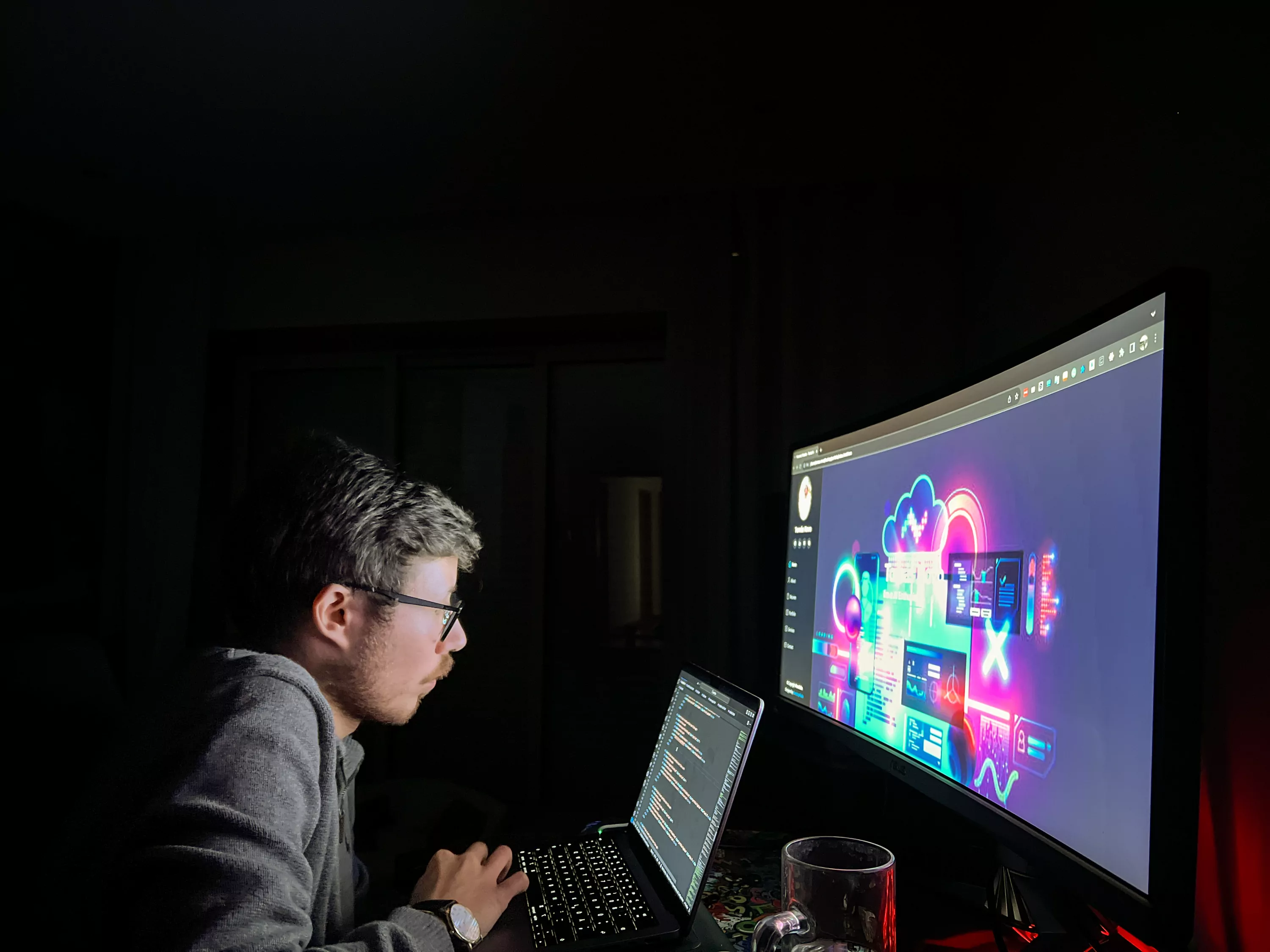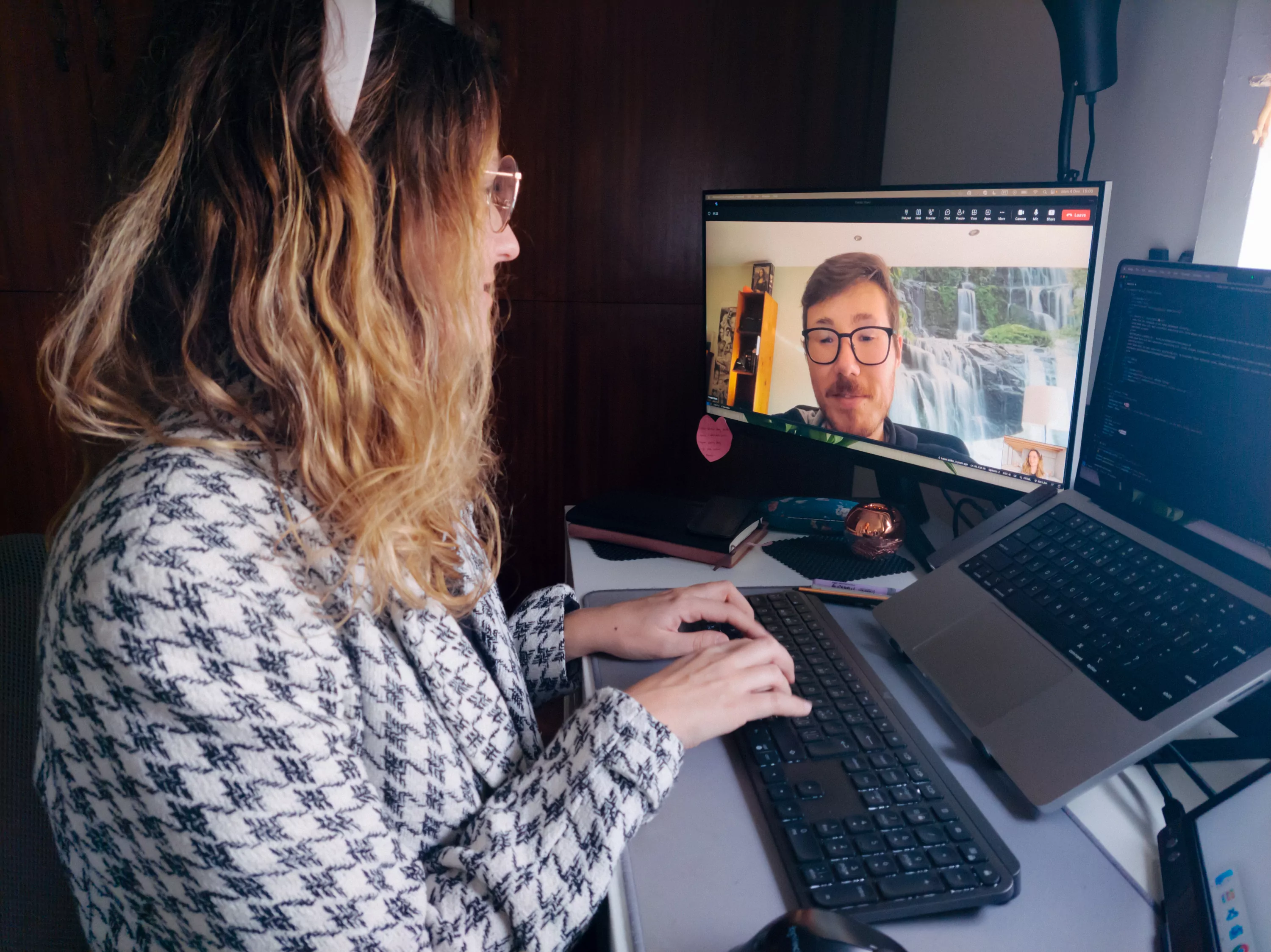It’s developers like Aurora and Tomás who push the limits of using AI in every company – as part of the development craft, they challenge themselves and others constantly.
Aurora:
When I was in college, I had to create an application in veterinary medicine, an app with which you’d take a photo from animals, and it would tell you what disease it had. That’s when I worked with AI as a developer for the first time. After a first internship and a second, I came back to VI this year and have been a Junior Frontend Developer ever since.
For me AI is like this little monster. Sometimes I ask ChatGPT: „I have this and this bug and I am working with this specific language.“ It gives me three or four options of what is going on there. Before ChatGPT, you would google the problems you have. You’d find developers with the same problem and would have had to explore the solutions they found. Not all of the solutions would work, so you’d need to adapt to the project context. Usually, I have to open a couple of websites and scroll through them. Now ChatGPT summarises the options for me. It really saves me a lot of time.
BlackBox is really good for coding. I haven’t done much with it here, because of confidentiality issues, but if you send it a print screen, it will code everything from it, which is amazing. But ChatGPT and BlackBox make a lot of mistakes. You have to correct their work; it’s not perfect. They just have a lot of knowledge. Sometimes I ask the tools: „How do I solve this problem?“ And ChatGPT sends me a script of code.
 Aurora Vasconcelos is a Frontend Engineer at VI. She is mostly working from her home in Porto.
Aurora Vasconcelos is a Frontend Engineer at VI. She is mostly working from her home in Porto. Sometimes I know exactly what I need and I know it will take me a while if I code it from scratch. So I ask the tool for the function, even if it’s not a hundert percent what I need. I can always adjust it. Other times we have these complex projects at VI. I cannot just copy and paste the lines of code, it may lead to confidentiality conflicts, but I can ask Blackbox without context for help. I will have to adjust to the context, for example I’d ask: what are the variables names?
But there is stuff we should never disclose. I feel we have a lot of discussions about this in the craft, what is good practice, what is not? Having this environment really helps me grow. If you are not sure about something, you are free to ask about it.
"Better to ask than to make a mistake."
Although we use AI to save time, sometimes ChatGPT sends me codes like a 5-year-old would. So for now, developers are still needed. In the future developers will have to work on tasks that require more thinking, like team lead roles; AI will never be able to manage human beings, because it doesn’t understand us. We just need to keep in mind that AI is powerful, but it’s not a human being. It will never be able to replace a designer, because only they know how humans interact with a website.
One person who really influenced me in using AI is Tomás. He always tells me: „Aurora, ask ChatGPT, it’s there for you, it helps you.“ So I started to use it more and more.
 Tomás Novo is a Backend Enigeer at VI and has former experience from working with AI.
Tomás Novo is a Backend Enigeer at VI and has former experience from working with AI. Tomás:
I saw that Aurora was losing a lot of time analysing code; I told her she can just put the code into ChatGPT – if the code was not ours and therefore not data sensitive – and ask for an analysis. As a developer, you don’t have to go that deep into some awful documentation anymore, the tools do that for you. It is a frustrating part of the job, when the documentation is not that good, you know.
I previously worked with AI and natural language processing; my thesis was a bot which aim was to identify misinformation about Covid on Twitter. So I think AI did not come to replace us but to support us. We just really need to use it correctly. It really depends on what you’re working on, because there are cases where you actually are more efficient doing it yourself. I don’t think that you get more stupid using it. You get a result, for example, ChatGPT provides you code. But you never trust the code. You always have to check it. You really have to be careful with the outcome, you have to analyse it, test it, fine-tune it.
"ChatGPT provides you code. But you never trust the code. You always have to check it."
When I started working at VI, there were no helpful AI tools at the time. Now it’s really a hot topic. We did a workshop when AI started to appear: a colleague suggested we do an AI bootcamp. I did a small presentation with the title What Is AI and How Can we Work with It. I like technology and am constantly researching which tools are helpful.
I only use two tools in my daily work: ChatGPT and GitHub Copilot. For some cases they are more efficient. Copilot helps you writing code, as it was trained on coding. We always have to recheck and replace some stuff, but it proves efficient most of times. If you analyse code – other code, as we cannot use code from private projects in ChatGPT – and you don’t understand it, you just ask the tool: “Explain this to me.”
In the end, as a developer, you have the knowledge and the coding skills. AI just saves you implementation time, but your knowledge is there. It boosts your efficiency. But it doesn’t make you stupid.
 Aurora and Tomás often talk about AI and how to use it. (Remote Pictures: Alex Gotter)
Aurora and Tomás often talk about AI and how to use it. (Remote Pictures: Alex Gotter) 
